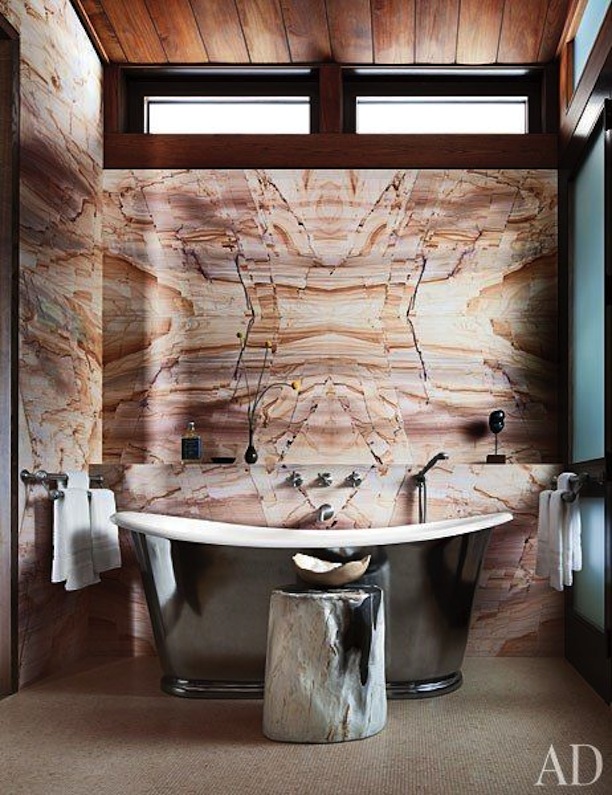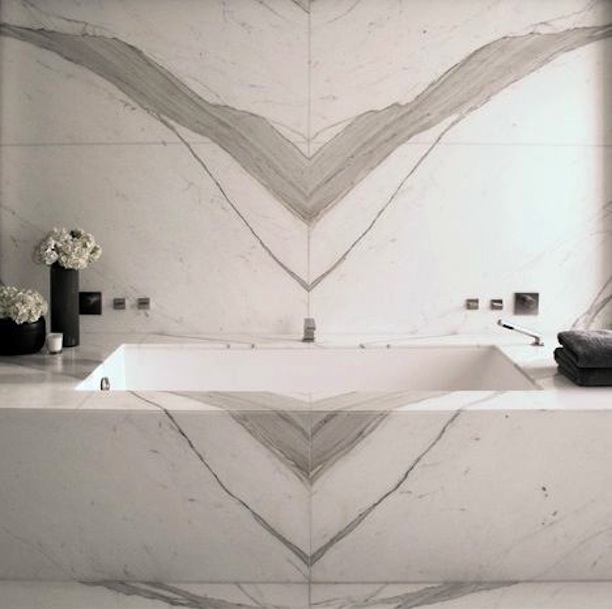A Little About Marble
 Pros
Pros Marble is one of the most classic stones that come to mind when designing with luxury and beauty in mind. Marble is reminiscent of the beautiful statues and building of antiquity; it has a soft, almost translucent quality to it. Marble is great for baking, as its properties keep it much cooler than other surfaces. Some rarer types of marble are very expensive, but the more common Carrara (also called Carrera) marble is one of the least expensive natural counter tops. Marble is often the go-to stone people think of when designing their kitchen.
Cons
• Scratching or Etching- Marble can scratch easily, especially when touched for a long period of time by something acidic. A slice of lemon laid down on a polished countertop overnight can leave a mark in the shape of the lemon slice, duller than the surface around it.
• Staining - Marble can also stain; red wine and some fruits are infamous for leaving indelible stains on the marble.
Book-matched Marble
Marble can be book matched, which is when slabs are cut from the same stone, but polished on opposite sides. The vein patterns can be lined up with awesome results:

We love the look of book matched marble; the symmetry adds a whole new layer to the beauty of the random patterns and variations of the rock. The combination of the chaotic patterns of nature and the design, work, and selection by man when using marble is a microcosm for everything we design and build. We use materials furnished by nature, apply our will to it, and let the beauty of the universe inform our design.

Countertop Alternatives
The big problem with marble is that it is very high maintenance. So much so that the care that it takes to have marble in a kitchen can be a deal-breaker for some people. Fruit, wine, and coffee - anything acidic - can easily stain your counter top. Marble is a relatively soft stone, and so it chips and flakes pretty easily: even opening a bottle of wine over the counter could scratch it.
Quartz Counter Tops
Quartz counter tops are made by grinding up and/or breaking quartz into a fine powder or little pieces. A binding element is added to the grain and then the mixture is poured into molds. The resulting counter tops is
possibly the toughest counter tops you could get. The quartz is non-porous, so stains from citrus, wine, or coffee is basically nonexistent. Quartz counter tops are essentially maintenance free.
The major downside to quartz is that it can be very expensive, and it is susceptible to heat.
 |
| Gioia Carrara Polished Quartz by Vicostone |
 |
| Bianco Venato Polished Quartz by Vicostone |
 |
| Minuet Quartz by Viatera |
 | ||
| Rococo Quartz from Viatera |
 |
| Misty Carrera from Caesarstone |
 |
| Torquay Quartz from Cambria |
 |
| Calacatta Marble Laminate by Formica |
Granite
Granite is a super-durable material for counter tops. It is heat resistant, and so you can put a pot or pan straight from the oven directly onto the counter. This is something people without granite counter tops might not think about, but when you can do it, it is very nice in the kitchen. Granite is harder than marble too; you will find that you can even cut on it if you want to, but it might dull your knives!
However, like marble, if granite is not properly sealed, it will stain when fruit juice or wine sits on it. And like quartz, it can be even more expensive than marble.
When a client is seeking the marble look we tend to specify a quartzite, in its simplest terms quartzite has the veining and texture of marble with the durability of a granite, however it is typically more expensive than marble and granite.
Best of both worlds?
Some people decide that they can enjoy the look of marble as a back splash, while using quartz or another alternative for their actual counter tops.
This is a good compromise, because you won't have to baby your counter tops nearly as much, but you can still have marble in your kitchen. Also, the use of two different materials always gives designers some interesting options for juxtaposition.




No comments:
Post a Comment